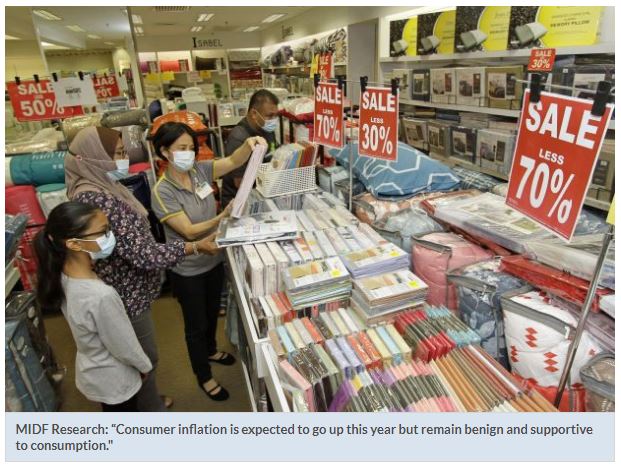Malaysia: Private consumption rising
PETALING JAYA: The increase in private consumption, on top of it benefiting from the low base last year, will be more evident from the second quarter of the year.
MIDF Research attributed this to the National Covid-19 Immunisation Programme which has kicked off and the vaccination rollout will be carried out in phases throughout the year.
The research house said the temporary disruption to offline spending with restrictions in place to curb increasing Covid-19 cases in the country could also be mitigated by online spending.
It expected the low overnight policy rate and fiscal stimulus packages particularly though rakyat-centric measures such as i-Sinar, Bantuan Prihatin Rakyat, wage subsidy and loan moratorium to continue providing support to the estimate.
“Consumer inflation is expected to go up this year but remain benign and supportive to consumption.
“Services sector in general will also return to positive territory this year but some services involving hotel and aviation are likely to still be pressured by the international border closure, ” it said in a note.
MIDF added that Covid-19 stifled domestic demand in 2020 as consumers reduced spending due to high uncertainty.
It expected this to continue going into the first quarter of 2021, with the movement control order (MCO) in place.
The research house expected a temporary setback to the labour market recovery as some businesses may hold hiring due to the lower business activities during the MCO period, which will affect income prospects.
Malaysia’s distributive trade came in at a six-month low in January at -2.7% year-on-year (y-o-y) as all sub-components registered a fall due to implementation of MCO 2.0 that resulted from a surge in Covid-19 cases in the country.
Wholesale trade, which held the largest share of total distributive trade, decreased marginally at 0.4% y-o-y but remained on an improving note since October 2020.
Similarly, retail trade fell 2.5% y-o-y, a higher pace than the previous month while motor vehicles plunged 13.8% y-o-y after six consecutive months of positive growth.
MIDF said this was due to the drop in traffic volume to showrooms resulting from MCO 2.0.
It also pointed out the possibility of some sales being brought forward in Dec 2020 to enjoy the government’s incentive on passenger vehicles’ purchase and year-end discount.
On a seasonally-adjusted monthly basis, distributive trade fell 2% month-on-month (m-o-m), driven mostly by motor vehicle sales which contracted 18.2% m-o-m while wholesale and retail trade managed to expand.
Meanwhile, most key countries also recorded slower performance in retail sales in January amid renewed movement restrictions.
The eurozone retail trade plunged 6.4% y-o-y, the steepest decline since April 2020 while Japan and Singapore continued contracting at a higher pace to a four-month low and three-month low respectively.
Consumption in Singapore has been weakening even before Covid-19, with the latest retail trade data of -6.2% y-o-y marking the decline of 24 consecutive months.
Indonesia’s retail sales remain in contraction but on a softer note at -16.4% y-o-y while the United States registered the biggest expansion in retail sales since September 2011 at 7.4% y-o-y.
The US consumers ratched up their spending during the month on the back of late-year stimulus checks and unemployment benefits which were signed by then President Donald Trump in the final week of December.
“In general, consumption is expected to improve in upcoming months driven by strengthening sentiment from vaccination programmes worldwide on top of expansionary monetary and fiscal policies, ” MIDF said.
Source: https://www.thestar.com.my/business/business-news/2021/03/15/private-consumption-rising


 Thailand
Thailand




